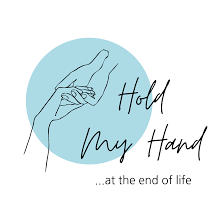
As the European Union renews its institutional architecture, it needs to step up action to ensure equal treatment in old age. This was the main premise of our 2024 annual conference ‘Writing the next chapter for AGE Equality in the EU’ that took place on 12th June in Leuven, Belgium.
Against the backdrop of the recent European elections, AGE annual conference reflected on the achievements of the past legislature toward an EU for all ages but also took stock of remaining opportunities to make new commitments for the next five years.
Our hybrid event brought together about 125 people (in-person and online), including key actors in the field of age equality: EU and UN officials, representatives from EU equality bodies and networks, civil society organisations and key experts and partners.
Removing barriers to equal treatment and participation
In his opening statement, Mr Younesse Kaddour Djebbar, Political Advisor to Marie-Colline Leroy, State Secretary for Gender Equality, Equal Opportunities and Diversity reiterated Belgium’s support for equality across the EU. He referred to the Belgian Presidency’s persistent efforts for the adoption of the long awaited horizontal equal treatment directive, which unfortunately were met with objections by a couple of member states. The Belgian official stressed the importance of this pending piece of legislation and commented on the important role of civil society to create societies where everyone can live in dignity.
Mr Marco La Marca, Member of the cabinet of Dubravka Šuica, 2019-2024 Vice-President for Democracy and Demography talked about the need to move away from stereotypical thinking and policies that view older persons as passive recipients. He highlighted the important role that older people play in our societies and called for initiatives that recognize and facilitate their participation. Mandatory retirement ages for Mr La Marca are driven by and legitimize ageism and need to be revised. The European Commission’s official mentioned that the next Commission should mainstream demographic concerns with interventions on labour market, pensions, health and long-term care, intergenerational solidarity and access to goods and services for all. Taken together such initiatives can enhance the sense of age equality and help celebrate longevity.
Need for further action and collaboration at different levels
Our first panel offered an opportunity to review existing protections against age discrimination at global, regional and local levels and provided evidence of the need for more specific instruments. Ms Kountouri Tapiero, Acting Regional Representative of the United Nations’ OHCHR Regional Office for Europe regretted the fact that ageism remains unrecognised and unchallenged. She suggested that the existing human rights framework is fragmented and inconsistent and cannot adequately address the existing protection gaps; this is why a new legally binding instrument, a United Nations (UN) convention to concretize and make equally effective existing rights in old age.
"Older people are overlooked by decision-makers at all levels. It is high time that we develop a comprehensive international legal instrument to address the unique human rights challenges that they face."
Elena Kountouri Tapiero, UN OHCHR Regional Office for Europe

Prof. Aoife Nolan, President of the European Committee of Social Rights explained the relevance of the European Social Charter of the Council of Europe. The dynamic interpretation of Article 23 on social protection of older people gives a lot of room to address ageism and promote full participation in society in old age. She also agreed that a new UN convention would provide additional clarity and impetus and help the committee in its work.
"European Social Charter provides unparalleled protection to older persons’ rights in terms of European Human Rights Law. It must be at the heart of European efforts to make active social citizenship for older persons real."
Prof. Aoife Nolan, President of the European Committee of Social Rights
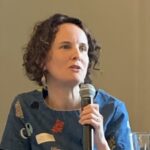
Mr Dedeu Fontcuberta, from DG JUST of the European Commission referred to the EC efforts to create a Union of Equality, which included the adoption of different equality strategies. At the moment, a dedicated strategy on age is missing, but for Mr Dedeu Fontcuberta age must be considered in the implementation of existing strategies and action plans.
"With the ageing population growing across Europe, it's more crucial than ever to ensure that our societies offer genuine equal opportunities for participation and inclusion at every phase of life."
Carles Dedeu Fontcuberta, Deputy Head of Unit D1- Non-Discrimination, European Commission

Ms Ekova, representing the “Smart Against Ageism” project stressed the invisibility and normalisation of ageism by individuals and decision-makers alike. She concluded that there is a need for better legal protection and grassroots initiatives that aim to prevent ageism.
"Age discrimination occurs in different spheres of life and at various levels. A combined political and societal approach is needed to ensure equal opportunities, rights, and joy for all ages."
Kalina Ekova, Coordinator at Alzheimer Bulgaria Association and project manager for the “Smart Against Ageism” project
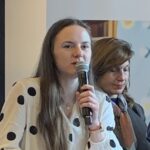
Participants referred to the important role of education and the need to integrate old age inequalities in discussions on the Summit of the Future and the priorities of the next European Commission. Panelists also stressed the need for collaboration, which could mutually reinforce efforts at international, European and national levels.
Intersectionality must be at the heart of equality initiatives
Our second panel brought together activists from EU-based equality networks. Alejandro Moledo from the European Disability Forum, Mary Collins from the European Women’s Lobby and Aida Yancy from EuroCentralasian Lesbian Community discussed achievements and shortcomings of existing EU-level equality initiatives. The audience and speakers revealed a number of issues facing older people with disabilities, older women and older lesbians. The three NGO representatives mentioned that dedicated strategies and action plans are helpful because they increase visibility, give specific timelines and keep the EU accountable. However, they also commented that it is difficult to monitor how strategies are implemented if data is insufficient.
"While women live longer, their quality-of-life years are shorter. Women become invisible as they age. Data on male violence against women stop at the age of 65"
Mary Collins, European Women’s Lobby
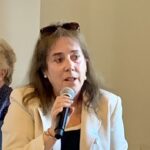
The three speakers agreed that older people belonging in minorities and women as they age often become invisible in statistics. They also stressed that strategies need to talk to each other to ensure that people at risk of discrimination at the intersection of different grounds are adequately covered and addressed by EU action. Targeted attention and funding for underrepresented individuals, marginalised and minority groups are very important to advance equality for all.
"The EU’s equality framework is great but more can be done. A truly intersectional approach is indispensable for the inclusion of LBTI women of all ages, races, and socio-economic backgrounds."
Aida Yancy, EL*C

Our civil society partners referred to important past milestones including the adoption of the EU directive on violence against women, the standards for equality bodies and the ratification of the Istanbul convention and the UNCRPD, which are crucial frameworks driving policy action and supporting NGO advocacy at EU level. As next steps, our colleagues want to see another Commissioner for Equality, and the revision of existing strategies with a stronger focus on intersectionality.
“The EU should strengthen its efforts and resources to achieve a Union of Equality, and the only way to succeed is doing it along with equality networks like EDF, AGE Platform Europe and others. Nothing about us, without us!”
Alejandro Moledo, European Disability Forum (EDF)

Opportunities and challenges for the next EU legislature
Our closing panel looked into the future of Age Equality in the EU. Marzena Okła-Drewnowicz, Minister for Senior Policy of Poland stressed that combatting ageism lies at the heart of her approach to changing ageing policy in her country. Education and intergenerational exchange are important aspects of this approach. She also underlined the significance of supporting older people in need of care and their caregivers.
"The rights of older people are still viewed only in the context of social welfare, which is reinforcing stereotypes. Older people should be seen as citizens entitled to a non-discriminatory life."
Marzena Okła-Drewnowicz, Minister for Senior Policy of Poland

Sirpa Rautio, Director of the Fundamental Rights Agency, explained that older people are high in her agenda, which will hopefully be reflected in the Agency’s future priorities. She noted that new areas such as AI, digital services, and access to justice present many opportunities for action. She expressed interest in gathering more information about older people without age limits.
"We all have a role to play. At the EU Fundamental Rights Agency we work to protect human rights of all people, young and old."
Sirpa Rautio, Fundamental Rights Agency (FRA) Director
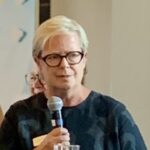
Patrick Charlier, Chair of Equinet emphasized the need for extending protection from discrimination beyond employment and made the case for a UN convention on the rights of older persons, whose added value became evident after COVID-19. Mr Charlier also reiterated the plight of older people belonging in marginalized groups and the need for legal approaches that take into account intersectionality. He also spoke about the particular complexity of accounting for age discrimination due to the normalization and wide acceptance of ageism in society, which demonstrates the need for further action in this area.
"One of the main lessons learned from the Covid-19 Pandemic, is the need to adopt an International convention for the rights of older people."
Patrick Charlier, Equinet Chair

Indeed, across the EU, age discrimination remains one of the most pervasive and socially accepted forms of unequal treatment. At the same time, it is the least legally protected ground because of the lack of an adequate legal and policy framework and varying interpretations of the exemption clauses included in the existing and proposed EU non-discrimination legislation. Ageism is manifested also through national, European, and international laws, caselaw, policies and practices that reinforce prejudice, perpetuate demeaning attitudes and limit opportunities for the equal participation of older people in society.
Our annual conference brought to light several complex experiences of age discrimination, but also the inadequacy of the existing framework to prevent and address them. In doing so, it has paved the way for expanding EU’s equality architecture through dedicated action on age equality.
Contact


